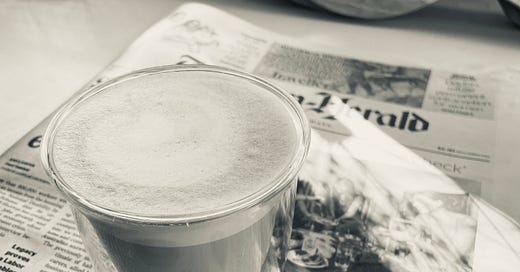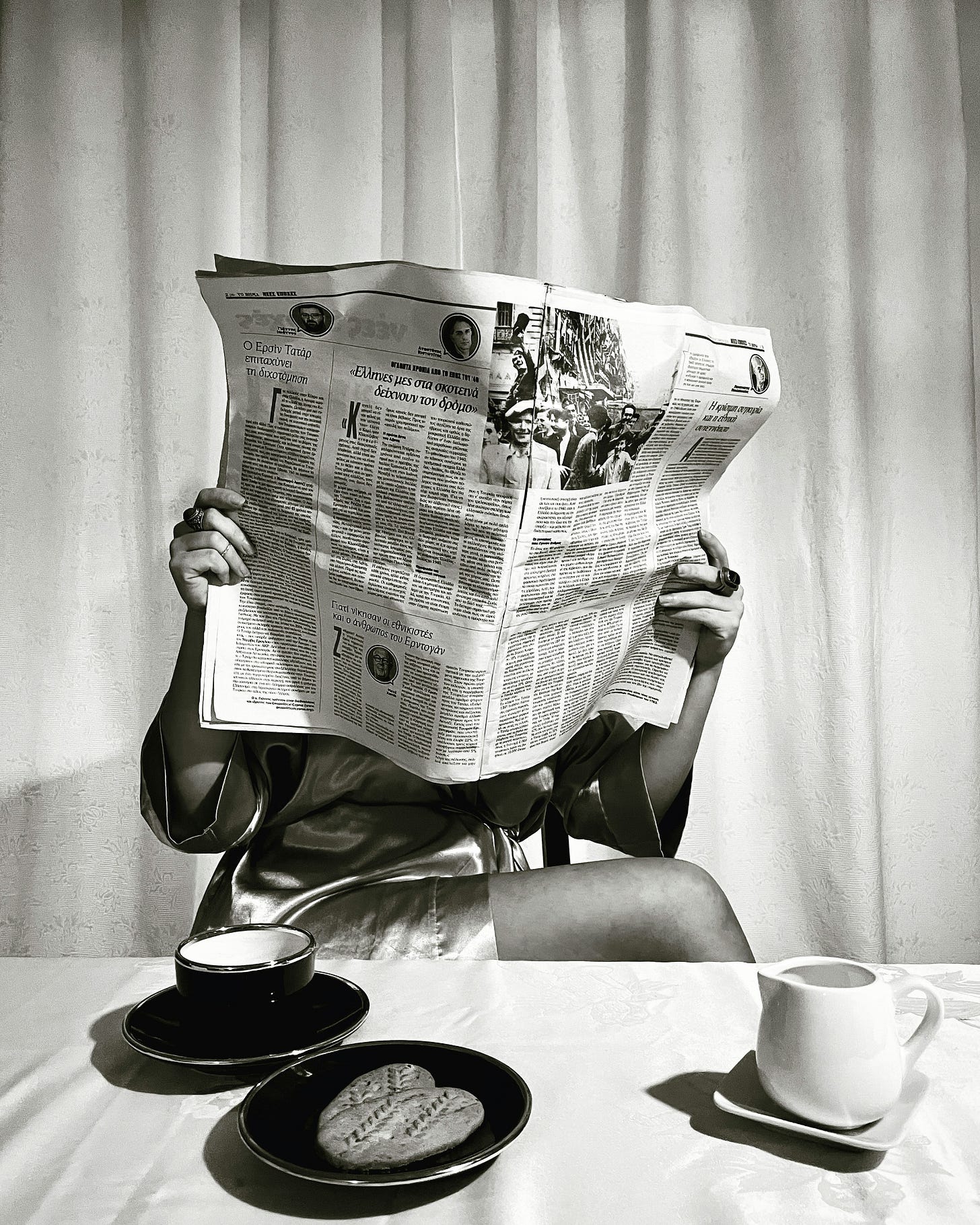This is something I’m asked about a lot when I’m interviewed about my books, but I’ve never actually written about it. I thought I’d take the time to do so now because it’s something of particular relevance to my latest novel The Last Illusion of Paige White.
One of the main characters, Jane, is a journalist. More specifically she’s a news reporter. I hadn’t really mined the years I worked as a reporter in my fiction, but this book, with its slightly more crime/thriller bent felt like the place to do so. The Sydney Morning Herald called The Last Illusion a “a psychological crime story…both small-town mystery and an unnerving excursion into the hall of mirrors that is the world of social media”, which I really like. It’s not a police procedural, nor straight genre crime, but I’ve used my reporter, Jane, to act as an investigator who returns home after the death of her friend, Paige White.
For the character of Jane I drew on my years of working as a young reporter for The Daily Telegraph in Sydney. I studied Arts at university - English, French, Philosophy, Psychology and Theatre Studies rather than Media. There were very few Journalism degrees when I was 17. And someone told me once that if I wanted to write I needed to have interests to write about. I don’t regret doing Arts. It taught me crucial skills for journalism, namely being able to digest huge amounts of information and research and distill them into something sensible. This is also the case for fiction writing. (And it’s disconcertingly one of the main strengths of AI, but that’s a topic for another day.)
Nevertheless, at the end of an Honours degree I realised I didn’t know how I was going to turn my skills into making money in the real world. I tried working in the arts as a theatre and dance publicist but found I was increasingly envious of the journalists who I was interacting with.
My break into journalism came reviewing theatre for street press magazine Drum Media. Every week I was given free tickets to watch various live shows around the city and all I had to do in return was write about them. That’s when I realised I could be a journalist. (I would later feel this way when I was sent on travel stories and all that was required of me was to put my experience into a couple of thousand words - something I enjoyed so much it didn’t feel like work). And of course, I saw my name in print for the first time and it thrilled me.
I’ve always found it romantic to read an old school paper with my morning coffee. I used to read it cover to cover, ink stains on my elbows. These days I only read a paper newspaper on weekends. Photo: Melpo Tsiliaki for Unsplash.
But in between the initial theatre reviews and the eventual travel stories was a lot of hard, hard work that wasn’t so enjoyable. One of my early journalism jobs required me to work a 3am-9am shift at a news service called Media Monitors, where I would go into an office in Redfern at a time when the human body should really not be awake and guzzle coffee while speed reading news articles looking for key words. I was essentially performing a job that AI would now do, but it taught me to speed read and to summarise. It also taught me that I wasn’t afraid of really hard, crazy work, which was good because a short time later I was awarded a cadetship (after working for free as an intern for many weeks) at The Telegraph and along with learning shorthand and writing the fishing report at the back of the paper, I entered the twilight zone that was the middawn shift.
This bane-of-everyone’s-existence shift started at 10pm and ended at 6am and we spent a lot of time in a car with a driver and a photographer listening to a police scanner. We’d cover car accidents (saw my first dead body), ram raids (WRX cars slamming into luxury goods shops), shootings (talked to a lot of bewildered neighbours in dressing gowns), fires (fire fighters are indeed very brave), late-night brawls (had a knife pulled on me in a kitchen and was surrounded by a group of men in two memorable incidents) and any other number of crimes that I have filed away (probably repressed) in my memory.
But nothing could prepare me for death knocks. This was when the news desk chose the least intimidating seeming person on the team to go and ask a family who had just lost a loved one to share their story with the paper. In The Last Illusion of Paige White, Jane reflects on having to do this and the ethical dilemma it poses (the wider ethics of journalism are also for another post). How sometimes she and the photographer agreed to do a ‘grass knock’ where they told the news desk they tried knocking but didn’t. But how sometimes, to her surprise, she was invited into these homes by people who wanted to talk about their daughter, son, cousin, and wanted them remembered in print. And how, very carefully, she had written these people’s heartwrenching stories and tried to turn their pain into something meaningful.
These stories, the funerals I covered and the tragedies I wrote about (I was a medical reporter for a year so saw a lot of sick kids) have stayed with me. I think perhaps, as is often the case with fiction writing, my latest book is me processing some of these experiences that still linger in my subconscious.
But back to the actual writing. Truth be told, the writing was not a large part of being a news reporter. It was the final manic quarter of the day if you were lucky. Deadline was at 5pm and on a normal 9-5pm shift it was the actual chasing of the story that took up the majority of the day. But I did get good at identifying the emotional heart of a story quickly, whether a story ‘had legs’ and how to frame it.
A reporter is taught the inverted triangle, beginning with the most salient facts - the attention grabbing part of the yarn in the first sentence or par, and going down in importance. It was drilled into us that you only have a short time to hold the reader in tabloid journalism. This was many years ago. It’s even more crucial now in our world of fractured attention spans. While my fiction writing style may be a long way from my Telegraph news style, I think I still retain this knowledge in my bones - what makes a story compelling. Not dog bites man, but man bites dog. That is the tenet upon which all storytelling is built. Look not for the everyday but for the unusual, the unexplored, the unimaginable. That is what is fascinating to people.
And the power of anecdote, of personal story to make the writing sing. So here’s one. I remember one of my first assignments as a cadet was to go with a photographer to the Royal Easter Show to find a ‘colour story’ for page 3. Meaning a nice picture and a great human story. That might not sound so hard, but when you’re standing at the entrance to a massive showground with thousands of people, where are you going to find a ‘man bites dog’ story? After a day of walking all over talking to people, not quite knowing what it was I was looking for, someone mentioned a little boy who grew and cultivated his own plants. When I saw this boy I knew he was my story. He was only about five and he had entered all these plants he’d grown into the flower show. It was a beautiful and unusual story. The dad was so proud. I also remember that I had around ten minutes to write the story when we got back to the office.
If there’s one thing I learned during my time as a journalist it was that everyone - and I mean everyone - has a story if you ask the right questions and really listen to the answers. People hide some things and reveal others. Often I find that the hidden things are only very lightly buried. I’ve had many instances in my life where someone has told me something that no one else has known. I remember the moment the best friend of an ex told me that he was adopted. My ex was standing there and had known this man for a decade and had no idea he was adopted. I think the key is in the listening and perhaps in the withholding of judgement. People are so fascinating and complicated. Beautiful and flawed. They are capable of such inspiring and selfless acts and such cruel and depraved acts. I saw it all. I feel like this has helped inform the characterisation in my fiction.
Some other things I learned that I now use in fiction are to write fast and edit later. Get it all down without overthinking and then you can clean it up. As a fiction writer I get asked about writer’s block. I don’t really get a block (more like need to fill up an empty bucket) as the muscle of my writing was honed to write to deadline. I have more time now, but I still open the same portal to get the words down. Just get the words down.
And that leads me to: try to hold the writing loosely. Both in letting it flow and in knowing it will be changed by editors. This was another thing I learned - yes, you are the author, but as in making a book, it’s a team effort. You need to be flexible. One day readers will make of it what they will. You make it and then you send it out into the world where it changes shape. This is difficult (I still struggle with it) but it’s crucial.
Hunger for experience is an essential part of being a writer whether it’s journalism or fiction. Put simply there needs to be something to write about. Curiosity is also part of this. Writers and journalists are curious by nature. Cultivate this. Read read read read read. Everything.
Don’t be afraid of hard work. I realised very early on that I was not afraid to work really hard for what I wanted. That I had this innate kind of work ethic. And that possibly more than any writing talent, has served me in both journalism and fiction writing.
Lastly, I learned from doing it every single day for many years that creativity in its pure form - the making of a thing from nothing - is not something finite or miserly. It is infinite, boundless, plentiful. It is a thing you do - a craft - and it is in the hard crafting that beauty, or at least a good yarn, can be made.





